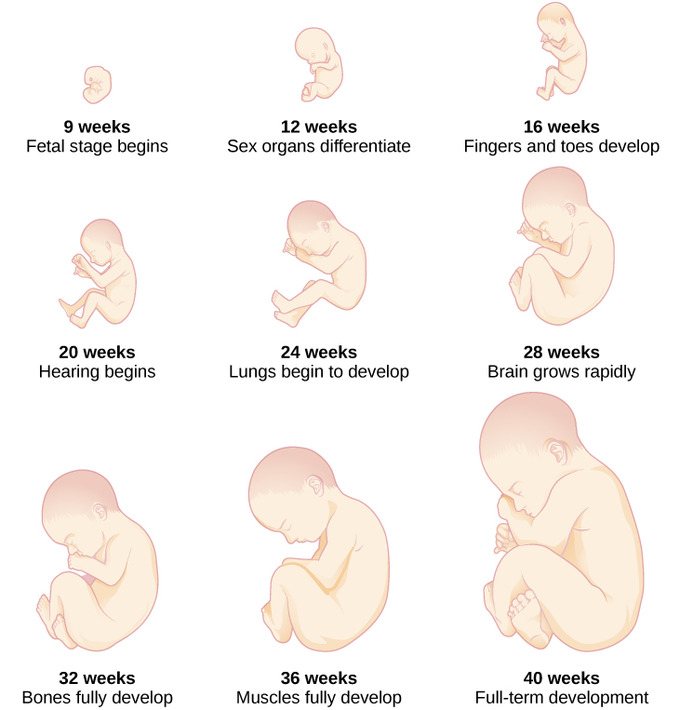 Source: bing.com
Source: bing.comTable of Contents
Introduction
Babies are a miracle of life, and their development is a fascinating process. Whether you’re already a parent or planning to become one, it’s essential to understand the stages of your baby’s development. One question that many people ask is, “How long until a baby is fully developed?” In this article, we’ll explore the answer to this question and more.
Stages of Baby Development
The development of a baby starts at conception and continues throughout pregnancy. There are three main stages of prenatal development: the germinal stage, the embryonic stage, and the fetal stage.
The Germinal Stage
The germinal stage is the first stage of prenatal development and lasts from conception to about two weeks. During this stage, the fertilized egg travels down the fallopian tube and begins to divide into multiple cells. The zygote eventually forms a blastocyst, which implants in the uterus.
The Embryonic Stage
The embryonic stage starts from the third week of pregnancy and lasts until the end of the eighth week. During this stage, the embryo’s major organs and systems begin to develop, including the heart, brain, and digestive system. The embryo also develops arms, legs, fingers, and toes.
The Fetal Stage
The fetal stage begins at the ninth week of pregnancy and lasts until birth. During this stage, the fetus grows and matures, and all the organs and systems continue to develop. The fetus becomes more active and starts to move around in the womb. The final weeks of pregnancy are crucial for the development of the nervous system, lungs, and immune system.
When is a Baby Fully Developed?
A baby is considered fully developed when it reaches full term, which is around 39 to 40 weeks of pregnancy. At this stage, the baby is fully grown, and all the organs and systems are fully functional. The baby’s lungs are mature enough to breathe air, and the digestive system is ready to process breast milk or formula.It’s worth noting that every baby develops at its own pace, and some babies may be born before or after full term. Premature babies, born before 37 weeks of pregnancy, may require extra care and support in a neonatal intensive care unit (NICU) to help them develop fully.
Factors That Affect Baby Development
There are several factors that can affect a baby’s development, including genetics, environment, and maternal health. Here are some of the most important factors to consider:
Genetics
Genetics plays a significant role in a baby’s development. The baby’s genes determine everything from its physical appearance to its risk of developing certain health conditions. It’s important to know your family medical history and have genetic testing if necessary.
Environment
The environment in which a baby grows can also impact its development. Factors such as exposure to toxins, poor nutrition, and stress can affect the baby’s growth and development. It’s essential to create a safe and healthy environment for your baby.
Maternal Health
A mother’s health during pregnancy can also affect her baby’s development. Poor maternal health, such as uncontrolled diabetes or high blood pressure, can increase the risk of complications during pregnancy and affect the baby’s growth.
Frequently Asked Questions
Here are some frequently asked questions about baby development:
1. How can I support my baby’s development?
You can support your baby’s development by providing a safe and nurturing environment, playing with your baby, and talking to your baby. It’s also important to get regular check-ups with your baby’s pediatrician and follow a healthy diet.
2. What are some signs that my baby is developing normally?
Some signs that your baby is developing normally include meeting developmental milestones, such as rolling over, sitting up, and crawling. Your baby should also be making eye contact, responding to sounds, and showing interest in toys and other objects.
3. What should I do if my baby is not developing normally?
If you’re concerned that your baby is not developing normally, talk to your baby’s pediatrician. They may refer you to a specialist or recommend early intervention services to help your baby catch up.
4. Can a baby’s development be delayed?
Yes, a baby’s development can be delayed for various reasons, such as prematurity, genetics, or environmental factors. Early intervention services can help your baby catch up if they’re experiencing delays.
5. How can I ensure that my baby is getting the nutrients they need for development?
You can ensure that your baby is getting the nutrients they need for development by following a healthy diet during pregnancy and breastfeeding. It’s also important to talk to your baby’s pediatrician about any vitamin or mineral supplements they may need.
Conclusion
The development of a baby is a complex and fascinating process that occurs over several months. A baby is considered fully developed when it reaches full term, but every baby develops at its own pace. By understanding the stages of baby development and the factors that can affect it, you can support your baby’s growth and development and ensure that they have a healthy start in life.
 Source: bing.com
Source: bing.com